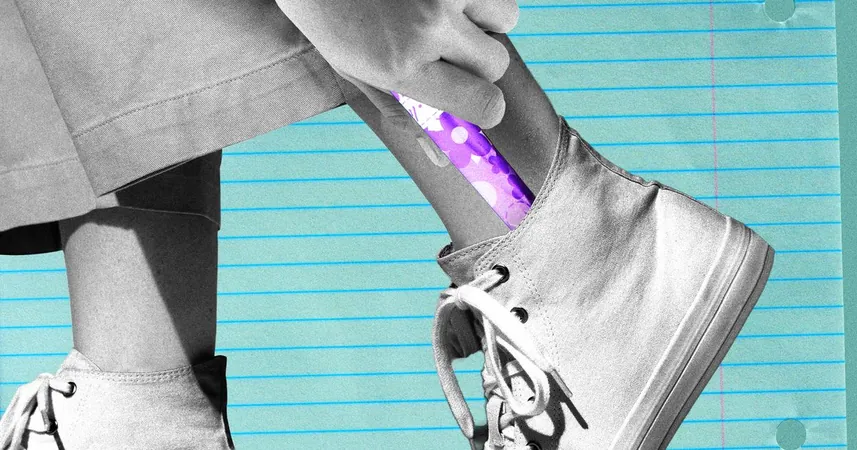
The Backpack Ban Crisis: How Teens Are Struggling with Periods in School
2024-10-08
Author: Mei
At just 10:30 a.m., Emma found herself in a panic, having bled through her pad at school. "I literally hate my life so much," she texted her mom, filled with dread upon seeing blood on her seat and feeling helpless about how to clean it without anyone noticing. Compounding her anxiety was the fact that her suburban Tennessee middle school forbids backpacks in classrooms. As a 13-year-old who was already grappling with the emotional turmoil of adolescence, Emma couldn't access extra pads in her locker or borrow any from the bathroom, which doesn’t stock these essential products. With no choice but to request permission to leave the room, she feared revealing her situation to her male teacher, all while a classmate hung nearby. "I feel like I’m in the frickin’ wild," she exclaimed, relieved when she remembered a friend stashed pads in her locker.
As school gun violence escalates, some administrators have opted for backpack bans, arguing that they’re a necessary measure to combat the hiding of weapons. A Michigan superintendent, for example, cited the explicit danger backpacks pose during school shootings, especially after tragic events like Uvalde and Parkland. Despite the growing number of schools enforcing these policies, security experts argue that their effectiveness in preventing violence remains questionable. Instead, students often hear reasons such as preventing drug use or managing overcrowded hallways.
However, these bans tragically exacerbate the already difficult experience of menstruating teens. Without a discreet way to carry sanitary products, girls find themselves scrambling for solutions to maintain their dignity during a natural biological process. Emma shares her desire for a safe environment where she can manage her period without added stress, contemplating homeschooling as an alternative.
In Tulsa, Oklahoma, Kristi Roe-Owen was outraged to discover that her daughter could no longer carry a backpack at school. In her blog, she expressed that the ban doesn’t provide any real security benefits and undermines young women's health and dignity. Schools have often suggested alternatives, like obtaining products from staff or the nurse's office, yet Roe-Owen’s daughter, Elle, found these options insufficient. "Asking for a pad would likely put a lot of eyes on me," she said, emphasizing the embarrassment of discussing such personal matters with peers, particularly boys.
To combat this awkwardness, parents and students are developing creative solutions for concealing their menstrual products. Techniques include using pouches, wearing cargo pants, or even innovative adaptations like zippered scrunchies. Emma and her friends often resort to stuffing products in their clothes, leading to missed opportunities for changing supplies when necessary, like when Maysa, a 13-year-old from Portland, was left with no choice but to bleed through her jeans rather than use low-quality supplies provided by the school.
Despite regulations mandating schools to supply free menstrual products, students report that vending machines are often empty, leaving them to scavenge for supplies from lockers in a way that attracts too much attention. The time constraints to discreetly change pads or tampons create additional stress as students risk reprimands for being late to class. For Emma, the experience is overwhelming—she recalls the teasing from younger girls and the anxiety of moving through the hallways with supplies in hand.
Educators feel the effects of these policies as well. One teacher, Katarina, recalls a student’s embarrassment as she attempted to leave a bag containing period supplies in a discreet corner of the classroom. While Katarina strives to provide quality menstrual supplies, the backpack ban complicates any solutions she might propose.
Parents like Roe-Owen persistently voice their concerns to school officials, hoping for change. In response, Elle insists, "They just need to repeal the mandate." Meanwhile, students like Emma look forward to high school, where the mere thought of carrying essential supplies in a backpack brings a sigh of relief. "I could never go back," she says, recalling the stress of her current circumstances.
The wider conversation around period management in schools reignites with every story like Emma's—an urgent call for change that prioritizes the health and well-being of students, ensuring they can navigate their teenage years with dignity and the necessary resources at their fingertips. Is it time for schools to reevaluate policies that hinder rather than help? The answer is more than overdue.




 Brasil (PT)
Brasil (PT)
 Canada (EN)
Canada (EN)
 Chile (ES)
Chile (ES)
 España (ES)
España (ES)
 France (FR)
France (FR)
 Hong Kong (EN)
Hong Kong (EN)
 Italia (IT)
Italia (IT)
 日本 (JA)
日本 (JA)
 Magyarország (HU)
Magyarország (HU)
 Norge (NO)
Norge (NO)
 Polska (PL)
Polska (PL)
 Schweiz (DE)
Schweiz (DE)
 Singapore (EN)
Singapore (EN)
 Sverige (SV)
Sverige (SV)
 Suomi (FI)
Suomi (FI)
 Türkiye (TR)
Türkiye (TR)